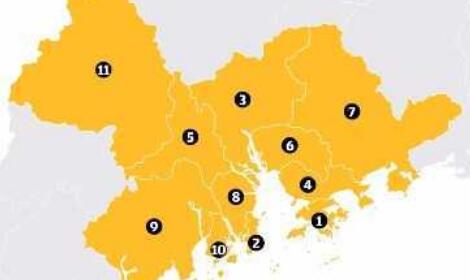【无评论】蒙古的反华态度(六)(终篇) [加拿大媒体]
几百年来,对邻国我们一直存在负面、中立或正面态度,政治精英出于各种原因操纵着公众态度。政治精英将负面态度制度化,负面态度就会影响人们的日常生活,甚至可能持续几百年。
Chapter 5: Conclusion
结论
Negative, neutral, or positive attitudes toward neighboring nations have existed for centuries, and political elites have manipulated public attitudes for a variety of reasons. Negative attitudes, when institutionalized by the political elites, can affect the people’s daily lives and leave lingering effects that may last for centuries.
几百年来,对邻国我们一直存在负面、中立或正面态度,政治精英出于各种原因操纵着公众态度。政治精英将负面态度制度化,负面态度就会影响人们的日常生活,甚至可能持续几百年。
Different research approaches examining anti-Americanism have reached the same conclusion: “anti” attitudes are multi-causal phenomena that need to be studied from a multidisciplinary perspective, same apply to anti-Chinese attitudes. The analytical frxwork used in this thesis considers three main causes of the “anti” attitudes: a power imbalance, a backlash against economic activities, and conflicting identities, in conjunction with the social-psychological notion of schema. These attitudes are manifested in different forms and have consequences on the daily lives of people and politics depending on its contexts and the level of institutionalization.
虽然反华态度的研究方法与反美主义不同,但是结论是一样的:“反对”态度是多种因素引起的,需要从多学科的角度来研究,反华态度同样适用。本文所使用的分析框架是“反对”态度的三个主要原因:实力不均衡、对经济活动的强烈反对、冲突性认同,同时结合社会心理学中的图式概念。这些态度表现为不同的形式,态度不同,以及态度制度化的程度不同,对人们的日常生活和政治产生影响也不相同。
The “anti” attitude is mostly prent in smaller nations and it targets major or regional powers. Anti-attitudes to neighbors or past colonial powers have deep-historical roots and well-developed negative schemas by political elites and intellectuals of smaller nations to distinguish their values, actions, and institutions to contrast of target nations. Therefore, these negative schemas are more about themselves rather than the target nations. For instance, anti-Chinese attitudes in Mongolia, anti-Americanism in Canada, anti-Nigerian attitudes in Ghana, and anti-Brazilian sentiment in Paraguay have a repertoire of well-constructed negative schemas and institutionalized through political process. These schemas resonate easily among public because they are closely lixed their daily lives, accepted as proven facts, and political elites know how deploy them strategically.
“反对”态度在小国很普遍,而且目标国都是全球性大国或地区性大国。对邻国或殖民国的反对态度,有很深的历史根源,政治精英和知识分子为区分目的国价值观、行为和制度,精心炮制了目的国负面图式。因此,负面图式更多的是关于自己而不是目标国家。例如,蒙古的反华态度、加拿大的反美情绪、加纳的反尼日利亚态度以及巴拉圭的反巴西情绪,都是精心构建的负面图式,并通过政治程序制度化。这些模式很容易引起公众共鸣,因为这与公众的日常生活紧密相连,如何将目的国负面图式打造为铁的事实,政治精英深谙其道。
A few points need a more theoretical and empirical treatment. First, the “anti” attitudes used in repressive states, either totalitarian or authoritarian, are always institutionalized and therefore, have a more direct impact on domestic and international politics. The conclusion in Katzenstein and Keohane (2007), that anti-Americanism has no direct impact on politics, may only apply to democracies or nations that are geographically distant or that have had no past experience with Americans obviously the study does not include repressive states, excluding China. However, anti-American attitudes are more systematically institutionalized in repressive regimes.
有些结论还需要更多理论和经验方法来论证。第一,专制国家的“反对”态度,无论是极权政府还是专制政府,都是制度化的,因此,国内和国际政治的影响也更直接。卡赞斯坦和基欧汉(2007)的结论是,反美主义对政治没有直接影响,可能只适用于那些地理位置遥远的民主国家,或者过去与没有美国没有交集的国家,很明显,这项研究并不包含中国在内的专制国家,专制国家的反美情绪更加系统化。
Second, although public opinion polls suggest the persistence of the “anti” attitudes in any nation, more studies are needed to validate such a claim. Public attitudes are dynamic. Even people appear to demonstrate coherent unfavorable attitudes; they hold a multiple attitudes depending on the issue. Their attitudes are subject to alter due to personal factors (cultural and religious orientation, education, experience, and age), political and socio-economic factors, as well as geographic factors.
第二,尽管民意调查显示在任何国家,“反对”态度都会持续存在,这还需要更多的研究来证实。公众态度是变化的。即使人们展现出了一些列不友好的态度;但是针对不同问题,大家的态度也不一样。由于个人因素(包括文化和宗教趋向、教育、经验和年龄)、政治和社会因素,以及地理因素的不同,态度也会不同。
Third, through generational memories and imprinting, each generation has a collective memory of global, regional, and national events. The attitudes may change because of first- or second-hand knowledge about those events. Therefore, studies that consider generational imprinting may further our understanding of how anti attitudes can change over time. Or, how much impact do these well-developed negative schemas and narratives that are used to transmit “we know” views have on cognitive development of younger generations?
第三,由于时代记忆和时代印记,每一代人都有关于全球、地区和国家大事的集体记忆。对事件的直接经历或者间接经历会引起不同的态度。因此,关于时代印记的研究会帮助我们理解反对态度如何随时间变化。或者,这些为了传播“我们知道”观点而精心设计的负面图式和叙述,会给年轻一代的认知带来多大的影响?
The main purpose of this thesis is to find plausible explanations for the question: Why have anti-Chinese attitudes in Mongolia persisted, even after both nations have enjoyed friendly relations for more than two decades? To answer the question, I propose two explanations. First, the anti-Chinese attitudes in Mongolia are not different from any other cases of “anti- sentiments expressed between small and big neighbors. Second, the anti-Chinese attitudes have persisted because of the lingering impact of the government’s indoctrination and propaganda that was anti-Chinese during the 1960s and 1980s and the reluctance of the Mongolian political elites’ to de-construct the artificially-consolidated negative schemas (idea, images, and theories) about China, Chinese people, and their culture.
这篇论文的主要目的是解答下面这个问题:为什么中蒙两国建立友好关系已经二十多年了,而蒙古反华态度依然持续呢?我给出两个解释:首先,蒙古反华态度与传统的小国对大邻国的反对情绪没什么不同。第二,反华态度的持续是由于政府在20世纪60到80年代灌输和宣传中国负面图式造成的长远影响,而蒙古精英又不愿解构关于中国、中国人民和中国文化的人为强化的负面图式(观点、形象和推论)。
From examining the available studies and results of public opinion polls dealing with the attitudes toward China, the anti-Chinese attitudes in Mongolia are not different from other variants of anti-Chinese attitudes, despite differences in their intensity, and other factors related to time and location. The anti-Chinese attitudes are multi-causal, as are the sentiments of anti-Americanism. In almost every case, three main causes are involved, manifested differently, and have med and long-term consequences.
通过研究与民意调查,可以发现虽然强度、时间和地点不同,但是蒙古反华态度与其他反华态度变体并无不同。反华态度是多种因素引起的,反美情绪也是如此。所有的情况虽然表现形式不同,但是都包含三个主要的原因,同时产生中长期后果。
The negative schemas about China, Chinese people, and their culture were intentionally consolidated by the Mongolian ruling elites with a strong backing from the Soviets, during the 1960s to 1980s. Although the Mongolian political elites and intellectuals traditionally used negative schemas of China to differentiate Mongolian identities from Chinese for centuries, they never completely closed the sources of positive (or relatively neutral) schemas about China, as the communists had done. The communists used all available propaganda and coercive instruments to systematically create biases about China and Chinese people, and marginalized all dissenting views to justify “the Soviet political and military presence in Mongolia.” Nevertheless, in the 1990s, the political elites did not attempt to de-construct the negative schemas of the past. Instead, both the elites and the media enriched the anti-Chinese attitudes with new negative information about rising China and its hideous intentions to engulf Mongolia economically. Obvious changes were occurring in the attitudes of the Mongolian political elites toward China, since middle of the first decade of 2000, because of the increased interactions with Chinese counterparts, more information about China, and the economic reality. Nevertheless, negative attitudes toward China and Chinese people persisted in the media, and public surveys and discourses. The explanation for the persistence of negative attitudes in the public domain stems from the political elites’ and the media’s reluctance to de-construct the negative schemas of the past. The increased presence of Chinese labor, economic entrepreneurs, and low quality goods are now being interpreted in connection with past stereotypes and the systematically created bias. Political and business interest groups, and nationalist, xenophobic, and racist groups continue to target Chinese nationals and their businesses in Mongolia. Although anti-Chinese attitudes are not being institutionalized today, at the state level, the phenomenon from the past has been sufficiently intense to complicate current Sino-Mongolian relations and Mongolia’s foreign and domestic politics.
上个世纪60至80年代,蒙古统治精英在苏联大力支持下,强化了中国、中国人民以及中国文化的负面图式。尽管传统蒙古政治精英和知识分子利用中国负面图式来区分蒙古人,但从未像蒙古共产党那样,完全关闭有关中国的正面(或相对中立)图式。蒙古人民党利用一切宣传方法和强制手段,系统性地创造对中国和中国人民的偏见,并将所有不同意见边缘化,以证明“苏联在蒙古的政治和军事存在”的正当性。然而,90年代,政治精英没有试图解构之前的负面图式。相反,精英和媒体反而为反华态度增加了新的负面信息,包括中国崛起及中国意图从经济上吞噬蒙古。2005年开始,蒙古政治精英对中国的态度发生了明显的变化,因为与中国同行的交流越来越多,对中国了解更多,以及蒙古面临的经济现实。然而,媒体、公共调查和讨论对中国和中国人民的负面态度仍然存在。公共领域持续存在的负面图式源于政治精英以及媒体不愿去解构过去的负面图式。越来越多的中国工人、企业家和低质量商品在蒙古出现,正被解读为与过去的刻板印象和系统性的偏见有关。政治和商业利益集团,以及民族主义、排外和种族主义团体继续把目标对准中国公民以及他们在蒙古业务。虽然今天蒙古的反华态度没有制度化,但从过去到现在,这种情况已经很严重,这导致当前的中蒙关系和蒙古的外交和国内政治复杂化了。
“Anti” attitudes, in general, and anti-Chinese attitudes, in particular, need to be further studied. “Anti” attitudes (or “pro” attitudes) have been used by major powers to expand their influence in small, developing nations, and by political elites and various interest groups in developing nations to construct, consolidate, and manipulate the attitudes for different purposes. As a focus for future research, generational dimensions may also help to shed light on the issue, by understanding how generations respond to political, economic, and cultural manipulations of the attitudes toward a nation.
“反对”态度,特别是反华态度,尤其需要进一步研究。“反对”态度(或“赞成”态度)被主要大国用来扩大其在发展中小国的影响,以及发展中国家的政治精英和各种利益集团为了不同的目的构建、巩固和操纵。作为未来研究的重点,通过了解几代人对国家态度的政治、经济和文化操纵的反应,从代际维度来阐述这一问题,
Recently, the anti-Chinese attitudes have begun to pick up some qualities of the anti-imperial attitudes. All of China’s small, developing neighbors are watching for Chinese intentions for the future. China’s treatment of ethnic minorities, which has been historically, ethnically, and culturally tied with China’s neighbors, and with its dealings with smaller neighbors like Taiwan, Mongolia, Laos, and many others, will have an impact on the global attitudes toward China. Any threatening Chinese behaviors will invite responses from other major powers in China’s periphery and inflame the anti-Chinese attitudes of the political elites and public in China’s neighbors.
最近,反华态度已经开始从反封建态度中得到了一些启发。中国所有发展中邻国都在关注中国的未来意图。中国对待少数民族的态度,从与邻国在历史上、民族上和文化上的联系。中国如何处理与台湾、蒙古、老挝等小国的关系,将影响到全球对中国的态度。中国的任何威胁行为都会招致中国周边其他大国的反应,并激发政治精英和公众的反华态度。
Negative attitudes towards a nation are more easily institutionalized in repressive and controlled societies, creating long-lasting impacts. The intriguing question is: How can the artificially-consolidated negative schemas be de-constructed, as international relations become normalized and the repressive regimes transition to democracy?
在专制和受控制的社会,负面图式更容易制度化,更容易产生长远的影响。一个有趣的问题是:随着国际关系正常化,专制政府向民主过渡,这种人为强化的负面模式如何才能被解构?
Like anti-Americanism or anti-Semitism, anti-Chinese attitudes deserve further investigation, as they are re-emerging as a global phenomenon, and challenge the policy options of most governments at international, regional, and domestic levels. Anti-Chinese attitudes are not only a global problem, or a problem for China’s neighbors, but they are a problem for China, which must construct its own domestic and international policies.
就像反美主义或反犹太主义一样,反华态度值得进一步研究,因为反华态度正重新成为全球性现象,并给大多数国家的国际、地区和国内政策带来挑战。反华态度不是全球性问题,也不是中国邻国的问题,而是中国的问题,中国必须制定相应地国内和国际政策来消除反华态度。
Negative attitudes, as suggested by Katzenstein and Keohane (2007), are the obxts of political struggle, making the phenomenon attractive and complicated. In the case of Mongolia, the difficult question to ask is: How will these anti-Chinese attitudes evolve?
卡岑斯坦和基奥恩(2007年)提出的负面态度是政治斗争的对象,使这一现象具有吸引力和复杂性。就蒙古而言,一个棘手的问题是:反华态度将如何演变?
Three key factors will likely play significant roles. First, in terms of Sino-Russian relations, historically, the Sino-Russian honeymoon never lasted longer, and attempts by either to gain an advantage in their peripheries were only made when one were weak. If a rift comes, Mongolia will likely attempt to stay neutral or take a side until circumstances evolve precariously. Second, the future behavior of the Chinese government towards its small neighbors and ethnic minorities would be crucial. If China moves to unify Taiwan militarily, or intensifies the Sinicization of Inner Mongolia, Tibet, and Xinjiang, anti-Chinese attitudes of the political elites and public would likely become inflamed. Third, if the Mongolian political elites implement policies to de-construct the past, artificially-consolidated negative schemas about China, its people, and culture, and to regulate the interactions between Mongolians and Chinese in more transparent (and legal) ways, the biases and stereotypes that Mongolians have about China and Chinese people may eventually wane. In opposite, political elites and intellectuals could avoid de-constructing a repertoire of well-developed negative schemas in order to consolidate Mongolian identity (Mongolness) and to constrain Chinese growing influence and presence in Mongolia. Today it is the case in Mongolia. Finally, the level of anti-Chinese attitudes will also change as new generations of Mongolian political leaders take bolder steps to strengthen bilateral relations with China as the cohort of 1960s pushed for a strategic partnership with China in economic, cultural and educational cooperation. As a result of increased cooperation and Chinese “charm diplomacy” we might observe noticeable attitudinal shifts in the Mongolian public in coming decades. Whichever path future leads, it is important to de-construct the lopsided views about Mongolia’s neighbors during the Cold War in historical textbooks, literature and media. The biased view may do more harm than good for people and politics.
三个关键因素可能会发挥重要作用。首先,就中俄关系而言,历史上中俄两国的蜜月期从来没有长久过,双方都试图在周边地区获得优势,但是这只在一方国家变弱的时候才会出现。如果中俄之间出现裂痕,蒙古可能会试图保持中立,或在局势不稳定的情况下确定立场。其次,中国政府如何对待邻近小国和国内少数民族至关重要。如果中国要武力统一台湾,或者加速内蒙、西藏和新疆的中国化,政治精英和公众的反华态度可能会激化。第三,如果蒙古政治精英采取政策解构过去对中国、中国人民和中国文化人为强化的负面样式,以更加透明的方式规范中蒙交流,那么蒙古对中国和中国人民的偏见和刻板印象将会消退。相反,政治精英和知识分子会为了巩固蒙古的身份认同,避免解构精心设计的负面图式,并限制中国在蒙古的存在和影响。这正是蒙古的现状。最后,如果新一代蒙古政治领导人在60后领导人推动的与中国在经济、文化和教育上建立的战略性伙伴关系上采取更加大胆的措施来加强与中国的双边关系,蒙古的反华态度的情况将发生改变。随着合作的加深以及中国的“魅力外交”,在未来几十年,我们可能会看到蒙古公众态度的转变。无论未来采取哪条道路,在历史教科书、文学作品和媒体上,解构冷战时期以来蒙古对邻国片面的看法都是很重要的。对于人民和政治来说偏见的弊大于利。
版权声明
我们致力于传递世界各地老百姓最真实、最直接、最详尽的对中国的看法
【版权与免责声明】如发现内容存在版权问题,烦请提供相关信息发邮件,
我们将及时沟通与处理。本站内容除非来源注明五毛网,否则均为网友转载,涉及言论、版权与本站无关。
本文仅代表作者观点,不代表本站立场。
本文来自网络,如有侵权及时联系本网站。
图文文章RECOMMEND
热门文章HOT NEWS
-
1
他们认为,协商失败的峰会实际上符合中国的利益,而且北京的影响力将增加,因...
- 2
- 3
- 4
- 5
- 6
- 7
- 8
- 9
- 10
推荐文章HOT NEWS
-
1
这是中国中部河南省郑州的一个普通的星期六。富士康工厂大楼上空笼罩着...
- 2
- 3
- 4
- 5
- 6
- 7
- 8
- 9
- 10











